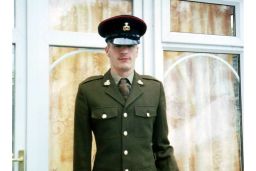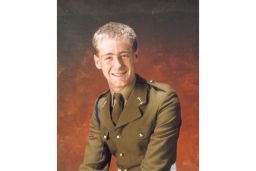Shaun Brierley kept his deployment to Iraq a secret from his parents. A father himself, the 28-year old didn’t want them to lose sleep over any dangers he might face in the war zone.
Leon Spicer had faced his own personal battle before he even made it to Iraq: A serious leg injury meant the 26-year old couldn’t travel with the rest of his battalion, and had to fight his way back to fitness first.
The two young soldiers were both proud to serve in the British Armed Forces – Brierley as a radio operator, Spicer as a top-cover sentry – but their Iraq tours would be cut shockingly short.
Within weeks of arriving in the country, each was flown home in a coffin, to be greeted by their stunned and grieving families.
Over the past decade, their relatives have struggled to cope with the void in their lives – the empty chairs at birthday parties, the loved one missing from family photos. The men’s parents have taken very different approaches to their loss.
And as the Chilcot Report on Britain’s role in the Iraq War is finally published, five years after the final hearings of a related inquiry, they have very different hopes for its outcome.
Chilcot inquiry: What Tony Blair and George W. Bush left behind in Iraq
Families devastated
Shaun Brierley wanted to be in the Royal Air Force, but when he went to the recruiting office, they were only looking for bandsmen and nurses, so he thought he’d wait a year and try again.
But then a friend wanted to sign up for the Army. Shaun went along to keep him company and wound up joining on the spur of the moment. His friend failed the medical.
What is the Chilcot report?
Brierley, described by family as “a good all-round sportsman” and a “caring lad” who looked after people, served in Bosnia, Oman and Germany, where he settled down and had a son, who turned 3 in 2003.
“After Patrick, my grandson, was born I’d go out to Germany each year at the beginning of March,” remembers Brierley’s father, Peter. “I got a phone call from his partner to say, ‘Are you still coming over or have you canceled the trip?’
“I said, ‘Why would we?’ and she said, ‘Because he’s not here, he’s in Iraq.’ He didn’t want us to worry, so he hadn’t told us.”
Weeks later, Brierley was killed when his 4x4 hit a pile of debris in the road and rolled over. An inquest into his death revealed that equipment on the vehicle had not been fitted properly.
“He was supposed to be off duty,” his father says. “But whenever they went out they had to have a radio operator with them, and the lad who was supposed to go was ill, so he went to help them out.”
Shaun’s body was flown back to the UK at midday on April 8, 2003, “10 years on, almost to the minute” after the passing out parade that marked the end of his basic Army training, Peter Brierley says. The whole family was devastated.
“It especially affected his sister,” Brierley says. “When she turned 18, he was out on an exercise so he missed her birthday, and he told her, ‘No matter where I am in the world, on your 21st I’ll be there for you.’ But by her 21st he’d died, so he couldn’t be there. That hit her hard.”
Roadside bomb
Leon Spicer, the middle child in a family of three, grew up in the Scouts, and had talked about joining the Army for years before finally signing up when he was 24.
Asked what her son was like, his mother Bridie Spicer jokes “daft as a brush!” before adding, much more seriously, that he was “a kind-hearted soul,” a funny guy “with a heart of gold” and a talent for cooking. Pancakes, she says, were his specialty.

A badly broken leg nearly ended his hopes of serving in Iraq. His regiment was deployed without him, but he “fought to get out there with them.”
Spicer’s commanding officer, Lieutenant Colonel Andrew Williams, praised the “grit and determination” he had shown “work[ing] against the odds … to be with his friends in Iraq.”
But after just seven weeks in the country, Spicer was killed when the Snatch Land Rover he was in was blown up by a roadside bomb in July 2005. He and his platoon commander were killed instantly. Another soldier from the same convoy died shortly after the attack in Amarah, in southeastern Iraq.
Bridie Spicer says her Christian faith and the rest of the family helped her through.
“We still keep his memory with us,” she says. “The anniversary of his death is coming up, and that’s another milestone, another thing to get through.
“We’ve got four grandchildren now, and we tell them all about their Uncle Leon, who they never met. We miss him terribly of course … but life goes on.”
War crimes trial
Peter Brierley dealt with his grief by campaigning against the war that killed his son.
“I believed every lie we were told before we went to war,” he says. But after Shaun’s death he joined the Stop the War Coalition and famously refused to shake hands with former Prime Minister Tony Blair.

“My wife had asked me, ‘What will you do if you see him?’ and I said, ‘Nothing, it’s a memorial service, it’s not the time or the place.’”
But when Brierley noticed Tony Blair signing copies of the Order of Service, which listed the names of the soldiers who died in Iraq, he felt he had to act.
“It was disrespectful,” he says. “I went across and said, ‘Excuse me Mr Blair.’ He stuck his hand out, and I said, ‘No, I don’t want to shake your hand, it’s got blood on it: my son’s blood, the blood of the soldiers, and the blood of the Iraqi people.’
“I told him that one day he’d have to face up to what he’d done. I didn’t shout or carry on, I just said it, turned and walked away.”
Brierley hopes that, 13 years on, Blair’s day of reckoning is nearly here. “We’re coming to the end, though it’s not over yet,” he says.
“I’d like Tony Blair to be tried for war crimes. I’d like there to be enough evidence to put him before a court, for there to be a legal process. If after that they say there’s not enough evidence, I’ll have done all I can.”
Hopes for closure
More than a decade on from her son’s death, Bridie Spicer says she isn’t investing too much time or energy in the Chilcot Report.
“What’s done is done,” she insists. “It’s not going to bring them back – 1,000 reports won’t change anything. Our son wouldn’t have wanted us to be bitter, he’d want us to get on with life.”
Spicer says she and her family won’t be in London for the report’s release. “We’ll have a copy in the post, but whether we’ll get around to reading it, I don’t know.”
She hopes that the end of the long-running Chilcot saga will mean all those who lost loved ones in the war will be able to look to the future.
“Everybody has to grieve in their own way … I hope it does give people closure, because I’m sure their loved ones would want them to move on, not to live in the past.”
But for her, there’s little point in looking to punish Blair for his role in the war. Blaming someone else, she says, would “take away from my son the courage he had to go to Iraq.”
“We all make decisions every day, and sometimes we make the wrong ones. Yes, Tony Blair sent them to Iraq, but he was the prime minister, it was up to him to make that decision.
“I’m sure he regrets it, but he has to live with that for the rest of his life – is that not enough? How is persecuting another human being going to help? They’re gone, and nothing will change that.”


















